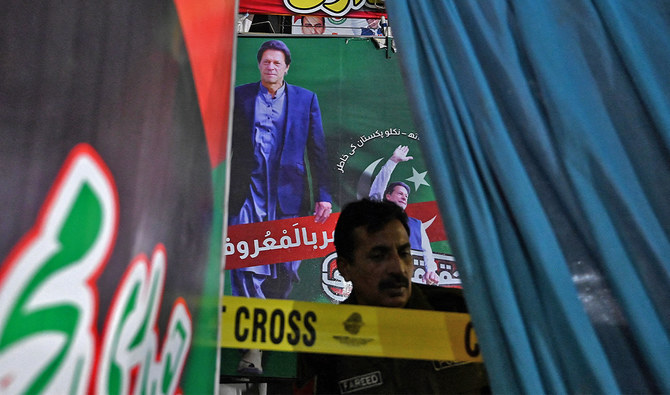ISLAMABAD: Threats to the life of former Pakistan prime minister Imran Khan have multiplied in recent days and the Punjab provincial government has taken "extraordinary" measures to ensure security around his residence in Lahore, the Punjab home advisor said on Sunday, more than a week after the ex-premier survived a gun attack in Wazirabad city.
Khan’s motorized caravan was sprayed with bullets on November 3 in Wazirabad, a city some 100 kilometres from Lahore, as he led his anti-government march through crowds of supporters on way to Islamabad. The attack killed one person and left Khan among ten others with gunshot wounds.
The ex-premier continues to recover at his Lahore home after being initially treated at Shaukat Khanum Hospital and has since been addressing protest rallies, led by senior members of his Pakistan Tehreek-e-Insaf (PTI) party, through a video link from his residence.
“We have received multiple intelligence reports indicating that threats to the life of Imran Khan have multiplied numerous times after the shooting in Wazirabad,” Omar Sarfraz Cheema, advisor to the Punjab chief minister on home affairs, told Arab News in an exclusive interview on Sunday.
Without elaborating the nature of threats, he said "extraordinary security measures" were in place around Khan's residence in Lahore to deal with any untoward situation.
“We are doing everything; taking all security measures that are humanely possible to protect our leader,” said Cheema, who is also a member of Khan's PTI party.
The government in Punjab province, where Khan and allies are in power, has deployed dozens of police personnel and commandos in and around his home as well as stretched a wall using sandbags around Khan’s residence. The ex-premier’s sons, Suleman and Qasim, who live in the United Kingdom with their mother Jemima Goldsmith, also arrived in Lahore this week to meet their father.
Khan’s party has acquired a new bulletproof container with a bulletproof glass podium atop to safeguard party leaders while traveling and addressing supporters on their way to Islamabad. The ex-premier has announced to join the protest march in Rawalpindi later this month, from where he would lead the marchers to Islamabad.
“The party has yet to decide if it will hold only a protest rally there (Islamabad) or turn it into a sit-in,” the home advisor said.
“Whatever the party decides, we will arrange fool-proof security of Imran Khan and participants accordingly.”
Before the attack on November 3, TV footage and videos shared online showed people welcoming Khan from their rooftops and overhead bridges, some even shaking hands with the former premier as his container truck passed underneath a flyover.
A spokesperson for the Punjab government told Arab News on Friday that Khan would not be facing the public directly under a new security plan. “Khan will be leading the march from Rawalpindi to Islamabad in a bullet-proof vehicle with zero public exposure,” the spokesperson said.
Cheema revealed the Punjab police had “more than one suspects” in custody, who were being interrogated about the Wazirabad shooting and "a breakthrough in the investigation was expected soon."
“The other suspects were arrested following a lead from the shooter who was arrested from the site,” he added.
The Punjab government has also constituted a five-member joint investigation team (JIT) to probe the shooting, which the home advisor said would formally start working from Monday.
“We have not set any timeline for the completion of the probe yet, but definitely it will be completed as early as possible,” Cheema said.
The Punjab police, after much delay, registered a first information report (FIR) of the Wazirabad attack on November 7, on the directives of the Supreme Court.
Khan had nominated Prime Minister Shehbaz Sharif, Interior Minister Rana Sanaullah and an Inter-Services Intelligence (ISI) official Maj. Gen. Faisal Naseer in his complaint to the police, but the FIR did not mention them as suspects.
Khan, once widely believed to have been supported by Pakistan’s powerful military establishment, is now considered to have fallen out with the army since his ouster in a parliamentary no-trust vote in April.
The former premier as well as members and supporters of his party have been criticizing the military for not intervening to block his ouster by a parliamentary no-trust vote in April, which he says was part of a United States-backed "foreign conspiracy."
Washington, Khan’s opponents and the military deny the allegation.
“A fair and effective investigation into this case is our top priority and we will be putting in our best to reach to the bottom of the conspiracy,” the home advisor added.
Khan started his motorized march towards Islamabad from Lahore late last month to force PM Sharif-led coalition government to announce early elections.
















